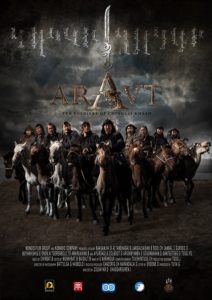Aravt: Ten Soldiers of Chinggis Khaan
阿尔巴特
Mongolia/China, 2012, colour, 2.35:1, 91 mins.
Directors: U. Shagdarsuren, Dorj Zolbayar.
Rating: 7/10.
Good-looking, well-played costume film lacks real spectacle alongside the human drama.
Mongolia, 13th century A.D. Following a fierce battle with the Hulin as part of his plan to unite all the Mongol tribes, Genghis Khan (aka Chinggis Khaan/Temujin) sees his troops struck by an outbreak of plague. He tells Lord of Myangat (D. Sosorbaram) to order one especially brave aravt (a unit of 10 soldiers), commanded by Tsahir (Batdorjin Baasanjav), to find the Master Physician (Jambal) who lives in the mountains of the Hulin with his granddaughter Unumunkhlei (D. Gantsetseg). En route, one of the soldiers in the aravt, Heekher (Buyankhishig), finds an abandoned baby boy whom they decide to take along with them; the cook Bukhtenger (N. Onon) is designated to look after it. The area is still full of Hulin rebels, including a group led by Harkhor (G. Zolboot), son of defeated Hulin chief Hukhtumur (Ayurdadi), and his subordinate Bukha (S. Arlunbyamba). The baby is, in fact, Harkhor’s son, and he is searching for it after finding his father-in-law and wife massacred and the baby missing – all of which he blames on Genghis Khan’s soldiers. The aravt finds it is being followed by Harkhor and his men but manages to evade them in the mountain forests. Harkhor reaches the Master Physician and Unumunkhlei (Dorjgotov Gantsetseg), with whom the defeated Hukhtumur is being treated for exhaustion. He urges his father to help find his baby son, but Hukhtumur says it is more important for him to journey west to Xisha to arrange an alliance and defeat Genghis Khan. Hiding nearby in the forest, the aravt is unable to contact the Master Physician; but Tsahir’s son, Shijirsanaa (B. Amarsakhan), manages to contact Unumunkhlei, whom he’d bumped into earlier, and finds out the best time would be when the Master Physician goes to pray alone to the mountain spirits next morning before setting out. Tsahir manages to clandestinely speak to the Master Physician then, but suddenly events take an unexpected turn.
REVIEW
A well-mounted action drama that’s strong on landscape, character and costumes but light on really gripping action, Aravt: Ten Soldiers of Chinggis Khaan 阿尔巴特 follows an elite group of Mongolian warriors on an expedition into the mountains to find a Master Physician who can save Genghis Khan’s army from an outbreak of plague. Set more in the country’s mountains and forests than in its wide-open grasslands, the widescreen movie is still a treat to look at, is very smoothly edited, and okay scored with plety of ethnic flavour in the percussion-heavy music. Performances, too, are natural and appealing, though the film spends almost too much time concentrating on its individual characters and building relationships inbstead of making the most of its setting and action possibilites.
As the group’s commander Tsahir, veteran Batdorjin Baasanjav 巴森扎布 – an actor with China’s Inner Mongolia Film Group who’s best known for playing the title role in the 30-episode TV drama Genghis Khan 成吉思汗 (2004) – anchors the whole thing with considerable gravitas, as a loyal servant of the Khan who watches as the expedition gradually runs out of control. He’s matched on the older side by Jambal as the old Master Physician and Ayurdadi as the leader of the rebel Hulin tribe that’s keeping the doctor captive. The younger characters, all abrim with personal honour and Mongol martial spirit, are individually well characterised – especially B. Amarsakhan as Tsahir’s son, N. Onon as the aravt cook and S. Arlunbyamba as a shady Hulin soldier – but there’s not much personal drama between them to drive the movie. There are the makings of a romantic triangle involving the physician’s granddaughter (sturdily played by the sole actress in the cast, Dorjgotov Gantsetseg, from My Beautiful Jinjiimaa Жинжиймаа, 2003), but it doesn’t go anywhere.
The film’s believable detail in costuming and daily procedures is paralleled by most of the action itself, which is more about hiding out in forests and tracking your enemy than about major battles – especially as this is a cast of tens rather than thousands. When the action does come, either face-to-face or on horseback, it’s gritty and staged in a semi-realistic style (with only occasional slo-mo), and though there’s plenty of slaughter there’s little visible gore. Overall, however, the film never attains the broadly heroic scope that the early scenes and dialogue seem to promise.
For the record, an aravt was a unit of 10 people in the ancient Mongolian army, which was divided according to the decimal system. The film is also known under the Chinese title 成吉思汗之十勇士 and English one Genghis: The Legend of the Ten. Co-director Dorj Zolbayar also had the same duties on No Right to Die: Chinggis Khaan Үхэж үл болно, Чингис Хаан (2008).
CREDITS
Presented by Mongol Film Group (MN), Nomadic Cultural Media (MN). Produced by Mongol Film Group (MN), Inner Mongolia Film Group (CN), Nomadic Cultural Media (MN), Qianqiu Enterprise (CN), Gemener Film & Television.
Script: O. Erdene. Photography: Hasbold, G. Battolga. Editing: B. Munkhbat, B. Baigalt. Music: B. Chinbat. Art direction: J. Tsog. Sound: B. Munkhbat, B. Baigalt, Wang Lewen, Ji Chenggang. Visual effects: J. Tuvshintugs, J. Tuvshinjangal, L. Nemakhbayar (Moon Studio).
Cast: Batdorjin Baasanjav (Tsahir, commander), D. Sosorbaram (Lord of Myangat), B. Jargalsaikhan (Esurteh), N. Onon (Bukhtenger), Jambal (Ahai, master physician), Ayurdadi (Hukhtumur, Hulin commander), Dorjgotov Gantsetseg (Unumunkhlei, master physician’s grand-daughter), D. Gursed (Nachin), Buyankhishig (Heekher), B. Amarsakhan (Shijirsanaa, Tsahir’s son), Ts. Tserenbold (Eter), T. Altanshagai (Uujim), Bodi (Sulbekh), Gombo Zolboot (Harkhor, Hukhtumur’s son), S. Arlunbyamba (Bukha), Yo. Tsog. (grandfather), Sh. Davaasamba (Bulter), Tuya (mother), P. Tserendagva (narrator).
Release: Mongolia, 21 Apr 2012; China, 27 Jun 2012.
(Review originally published on Film Business Asia, 17 May 2013.)
